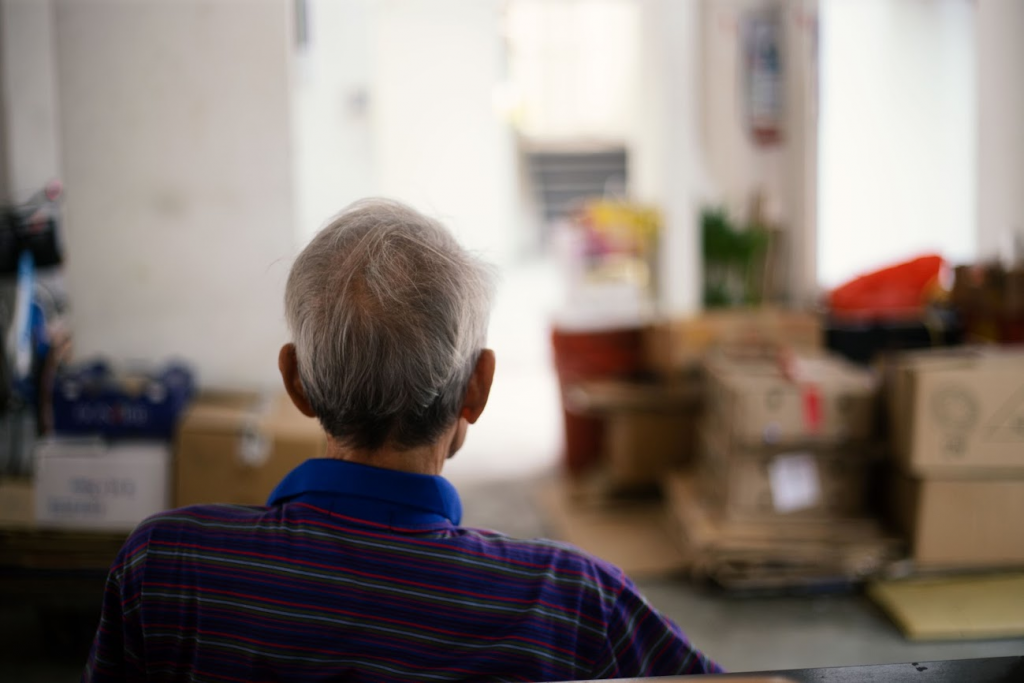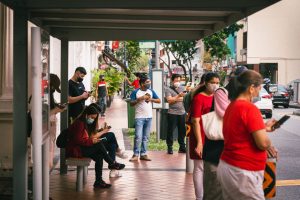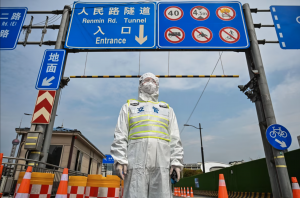All images RICE file photos.
As we creep into the midpoint of Phase 2 (HA) (II), an answer to the big question on everyone’s minds—when will the country reopen, and how?—has emerged. Going by what the government has teased in Parliament of late, the key to reopening might lie in differentiated measures based on vaccination status.
ADVERTISEMENT
In the last few weeks, decision-makers have suggested that going forward, vaccinated individuals will be able to participate in more activities than non-vaccinated ones, including the ability to dine out or use the gym. Since then, people have been split over whether such measures would be, well, divisive.
Are differentiated measures a sensible way to begin opening up while protecting the vulnerable, or does having ‘special rules and benefits’ for vaccinated people amount to discrimination against those who aren’t?
To unpack the ethics of differentiated measures, we spoke to Dr. Voo Teck Chuan, an Assistant Professor at NUS’ Yong Loo Lin School of Medicine’s Centre for Biomedical Ethics, and a member of the WHO Working Group on Ethics and COVID-19. The views expressed here are his own and not representative of any organisation.
This interview was edited and condensed from a longer conversation.
Sophie Chew: Could you summarise the objectives behind differentiated measures, and the main arguments in favour of them?
Dr. Voo Teck Chuan: The goal here is to reopen society without having everyone subject to the same burdensome restrictions, on the basis that vaccinated individuals are at lower risk of getting infected and transmitting the virus than unvaccinated individuals. Essentially, it’s a risk stratification strategy based on vaccination status.
From an ethical perspective, one approach which might support this is consequentialism, ie. that an act should be judged by its outcomes and whether the benefits outweigh the harms. If you allow restaurants to reopen and travel to resume, jobs and livelihoods might be saved, so there’s a socioeconomic rationale for that.
The other is what we call the ‘least restrictive’ principle: to the extent that people are no longer at risk of harming others (in this case, by spreading the virus), then there shouldn’t be a justification for putting restrictions on that person’s freedom.
Ultimately, any good public policy would seek to balance public health outcomes, protection of individual freedoms, and socioeconomic benefits and burdens.
What we want to avoid is people developing a binary mentality that
vaccination means this person is safe, and being unvaccinated means they aren’t.
And what about the arguments against it? We’ve seen things like this petition, which violently object to measures like vaccine passports for a number of different reasons, some understandable and others spurious.
Here, we need to distinguish arguments against these measures in principle from arguments about implementation.
Implementation concerns have to do with things like data privacy and preventing fraudulent proof of vaccination—issues that concern how such a policy will be rolled out. Then there are the arguments that differentiated measures are, as a matter of principle, wrong.
ADVERTISEMENT
Some of the arguments in the petition—for example, that a vaccinated person is as likely to be a carrier as an unvaccinated person—aren’t borne out. We do know that vaccination decreases the risk of transmission (though we are still determining the extent of this, especially for emerging variants).
But essentially, if you’re asking whether it’s justified to prevent people from doing certain things because of a lack of vaccination status, I would say that where we impose restrictions on things we understand as fundamental and important, like movement and socializing with others, then those restrictions have to be necessary and proportionate, and there must be very clear goals in mind. We shouldn’t do something heavy-handed where the costs are very high and the benefits very small.
With vaccination, it’s not just about protecting yourself, but wanting certain collective benefits. Until enough of the population has been vaccinated to achieve herd protection, these are the restrictions that we impose temporarily and in a way that creates the least burdens possible.
Differentiated measures should be temporary, to help achieve
some sanity (and hopefully stability) for the time being,
and removed once the public health goals are reached.
You don’t want to segregate people in the long run.

What are your thoughts on the argument that differentiated measures, or introducing vaccine passports, would create an ‘underclass’ of non-vaccinated people?
ADVERTISEMENT
I think this boils down to whether and how stratifying people according to risk is discriminatory.
There is no universally accepted definition of discrimination. For example, one might think of discrimination as treating people in a way that is wrongful, unfair, or unequal, based on their membership of a certain group (in this case, vaccinated vs. non-vaccinated individuals). The latter will experience disadvantages, but if those aren’t disproportionate, you could argue this is fair because they’re also at higher risk of infection and transmission.
Then there’s discrimination specific to an activity—who can do it and who can’t—versus broader social discrimination as an outcome, such that those who are unvaccinated have their interests set back a lot more, including in situations where differentiated treatment isn’t intended. We’ve seen incidents where people don’t want to share space with others perceived as high-risk, irrespective of vaccination status.
What we want to avoid is people developing a binary mentality that vaccination means this person is safe and being unvaccinated means they aren’t. Similarly, we should avoid making it a norm to exclude unvaccinated people from public spaces and social activities.
Again, it boils down to necessity and proportionality. Which activities are high-risk enough that differentiated measures might be temporarily introduced to achieve public health goals, and which can be safely opened up to all (and where the disadvantages of excluding unvaccinated people would be disproportionate to the public health gains)?
Ultimately, you don’t want to exclude people from essential activities.

But what constitutes an essential activity? I think it can be quite hard to find the border between an essential and a non-essential one, like dining out. Even if no one is forcibly injecting you or holding a gun to your head, it still curtails people’s ability to participate in daily life, and it’s understandable why some might consider that coercive, much as vaccination is an individual decision with collective consequences.
Honestly, this is hard, and what is essential should vary according to context. If it’s for activities which are good to have because they enrich your life, and viable alternatives exist (e.g. food delivery), I don’t think that’s as coercive, as compared to things like accessing public transport and supermarkets.
In general, I would say that where the risk of transmission is higher because of lack of effective distancing, and other public health measures cannot be used, that’s where status requirements like vaccine passports might come in. If people can be masked and distanced, that might not be necessary.
It’s also about what other health credentials you can use, or measures you can impose. I mean, for mass gatherings, you might want to rely on viral tests anyway since vaccination status tells you only general and not actual risk of current infection.
However, I would add that ‘coercive’ is not necessarily wrong in the context of a collective good like public health. Take seatbelts, for example. At a population level, you know there are fewer deaths if seatbelts are required. Similarly, we know that if we reach a certain threshold of vaccinated people, we get to recover part of our lives and economy. Limiting access is not as bad as a legislated vaccination requirement, where there are criminal or legal sanctions for non-compliance.
ADVERTISEMENT
It’s important to have clarity around where these measures will be needed,
what the objectives are, how long they will apply for, and monitor the effects against the evolving evidence…
I think that’s what any government should declare at the start,
rather than putting these measures out there but not communicating clearly what it will take to lift them.
Does this mean mandates are not a great idea? For example, France recently passed a law introducing vaccine passports and mandating vaccinations for all health workers, and in the US, companies like Facebook, Google, and the Washington Post are requiring employees to get vaccinated before coming back to work.
There are mandates and then there are mandates. There’s the strict legal sense, the kind where the law compels you to get vaccinated, and then there’s the kind where in order to do this job, it’s a requirement. They’re all different.
I don’t think we have reached a situation where we need to legally mandate that people get vaccinated. (Interviewer’s note: current MOM guidance states that while vaccination is highly encouraged, employers should not make COVID-19 vaccination mandatory, and declining vaccination should not be used as grounds for termination.)
On the whole, though it might be good to temporarily exclude unvaccinated people from high-risk activities, it’s also important to let people retain a sense of agency and control over their lives.
What you don’t want is for people to feel like they have no control over their lives and bodies. That’s when they engage in activities that can be detrimental to themselves and others or look for information that supports their stance against vaccination. There are groups of people who might not be anti-vaxxers but are just unsure about getting vaccinated. If they feel like they’ve lost agency or their vital interests have been set back, that’s when they can swing.

On that note, an article you wrote about vaccine passports suggested that ‘privileges’ might be a problematic concept in this context. Could you unpack this?
ADVERTISEMENT
This goes back to how vaccinated people will enjoy certain benefits relative to non-vaccinated people. ‘Privileges’ suggests something discretionary, which are given to you and can be taken away by an authority, and therefore aren’t intrinsically had or enjoyed equally by all.
But things like being able to move around and pursue our own life goals are important human goods. Some people might construe them as rights. They might be restrained temporarily in pursuit of a legitimate common good, say national security or public health, but there is also recognition that interfering with them requires strong justifications.
What we want to avoid here is this idea of ‘Oh, I don’t think you deserve these things, let’s take them away’. Instead, it’s about being committed to the idea that these rights and interests must be restored as soon as possible and feasible.
On the point of deservingness, I think this is where a lot of discomfort with vaccine passports lies— that it would be unfair to treat all unvaccinated people as a monolithic entity when we’ve seen that there are many different reasons for why people don’t get vaccinated.
There are people who don’t have a choice because of medical ineligibility, or who can’t get the vaccine because they’re on short-term visit passes. Pregnant women might be hesitant. Seniors who don’t see the need, or find it challenging to navigate the healthcare system.
For a lot of unvaccinated people, not getting jabbed is a question of individual risk calculation, rather than anti-vaxxer conspiracy theorising, but I don’t think there’s been much clarity on how a differentiated measures scheme would distinguish between all these.
I think this speaks to the difficulty of understanding public health vs. individual cost-benefit reasoning where health is concerned. For example, though we know that the vaccines in use have passed safety, efficacy, and quality checks, we are also still gathering information about adverse effects, like the possibility of heart inflammation which has been observed in certain populations, and I do think it’s understandable that people might want to wait and see.
This is where community engagement is important—to understand people’s concerns and where they’re coming from. A good policy can’t just benefit society on the whole, but should also mitigate individual burdens and inequities as much as possible.
We need a careful understanding of what warrants exclusion of unvaccinated people, what might warrant acceptance of other health credentials beyond vaccination status (e.g. a negative viral test or proof of recovery), and what would not warrant any health credentials at all.

We should also give consideration to potential exemptions and how they might apply. For example, people who are ineligible because of a known medical risk, which you would typically see in any sort of required vaccination regime. Or very young children for whom COVID-19 vaccines haven’t been approved—you might not give exemptions per se, but you could say something like ‘only X number of unvaccinated children will be able to participate in this activity’.
Participation in public life is important, be it for the economy or our personal and social well-being. What might help mitigate unfairness is the existence of alternative health credentials people can use beyond vaccine passports, along with clarity on how these differentiated measures apply, monitoring what harms and burdens might accrue, and so on.
It goes back to communication: this is not about punishment,
this is about finding the least restrictive way of dealing with risk.
A lot seems to turn on implementation, going back to the principles/implementation taxonomy you raised earlier—it essentially sounds like this is what would help mitigate unnecessary segregation. So what sort of pre-conditions would need to be met, or infrastructure is needed, for these measures to work?
Evidence on how much vaccines reduce transmission risk including for emerging variants, is one, Then there’s the use of alternative credentials, ie. whether a negative viral test, together with other measures, is safe enough for some activities.
Then there is mitigating burdens and ensuring equity. In Singapore, a lot of us are digitally savvy, but we must ensure that means of providing vaccination status meet the needs of those who are not, or who have disabilities that affect their ability to use certain technology.
The protocols should reduce the need for individual judgement calls. This includes policies to minimise invidious discrimination based on vaccination status.

There are privacy protection measures. You want to use the least amount of data required that’s linked to your identity. I think we have to concede that privacy can’t be protected in every situation—for example, if an activity requires proof of vaccination and I can go in but this guy can’t, I’ll know he’s not vaccinated.
But if you want to assure people that this won’t be tracked or used against you, then there should also be efforts made to address this, like assurances that this data will only be used for very specific public health reasons and nothing else.
That’s why it’s also important to have clarity around where these measures will be needed, what the objectives are, how long they will apply for, and monitor the effects against the evolving evidence.
There should be some commitment to lifting these measures once they’re no longer necessary. I think that’s what any government should declare at the start, rather than putting these measures out there but not communicating clearly what it will take to lift them. Knowing this is temporary would make it more understandable and tolerable for people, especially those who are not vaccinated.
What you don’t want is for people to feel like they have no control over their lives and bodies…
There are groups of people who might not be anti-vaxxers, but just unsure about getting vaccinated.
If they feel like they’ve lost agency or their vital interests have been set back, that’s when they can swing.
Would vaccine passports run contra to the understanding of COVID-19 as endemic? If we’re learning to live with the virus, and there are less restrictive alternatives available, would differentiated measures really be necessary?
To say it’s endemic means it’s here to stay and not going away, like the flu, and people learn to live with the disease because of the predictability of the risks—e.g. we don’t force people to take flu jabs, though it would definitely help reduce circulation if a lot more people were vaccinated.
Differentiated measures should be temporary, to help achieve some sanity (and hopefully stability) for the time being, and removed once the public health goals are reached. You don’t want to segregate people in the long run.

I want to return to the point you made earlier about agency, because it seems like a lot of these fears are also reflective of a broader climate in which there is so much uncertainty, and people are worried about all sorts of things—the lab leak theory, whether news about adverse effects is being suppressed, and so on. The science is evolving rapidly, and people in the media like me are struggling to wrap our heads around things, let alone communicate effectively, when what we understand is changing all the time.
I do think that in a public health emergency, including a novel infectious disease, people need to be prepared for high levels of uncertainty.
The science does evolve, and accordingly, if new evidence comes, the rules need to change. Accordingly, in my view, if decision-makers are acting in good faith, and in accordance with changing evidence, I think people do have to accept a certain amount of uncertainty—but again, there must be clear explanations for why certain things are being done, which by and large here I think the authorities here have given.
It’s honestly really difficult to communicate in an outbreak. You don’t want to overpromise. The best you can say in these circumstances is that if we do X, there’s a good chance that we’ll see results, but plenty is still being studied.
I feel like we’re used to the complete opposite in Singapore! We’re so used to having rules tell us you can do X, or cannot do Y, and having roadmaps for everything. But I do think the other side of the coin is that transparency is what creates public trust, rather than the other way around.
I think there are a lot of expectations from laypersons—which I consider myself; my primary training is in philosophy— in terms of ‘tell me what I can do and when I can do it, ASAP’. But the terrain here is simply unknown, and that needs to be understood by the public.
I do think our decision-makers, by and large, have been transparent—this is something which dates back to our experience with SARS in 2003—but again, you don’t want to make people feel like they’ve lost control over their lives. It goes back to communication: that this is not about punishment, this is about finding the least restrictive way of dealing with risk.
I only went into public health ethics more recently, which changed my perspectives on the issues, and my understanding of my own limitations in reasoning about what ought to be done. A lot of the public health aspects have been clarified for me by my colleagues who work in this; I can’t claim to be an expert on epidemiology.
Lots of people are writing about things as though they’re experts, especially on social media. Still, in my view, there has to be a certain level of humility in accepting what you do not know, and you need to be open to other perspectives.
Do you think introducing differentiated measures or vaccine passports would be discriminatory? Tell us at community@ricemedia.co. And if you haven’t already, follow RICE on Instagram, Spotify, Facebook, and Telegram.






